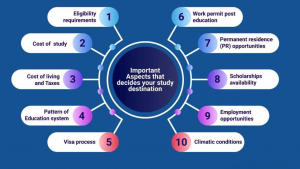


Study Abroad for International Student
Germany: The Academic Powerhouse
Study in Germany‘s educational landscape is renowned for its academic excellence, research opportunities, and diverse cultural experiences. Boasting a total of 422 higher education institutions, including 108 universities, Germany offers a wide array of programs to suit various interests and career aspirations. Here are some notable aspects to consider:
Top Universities in Germany
- Technical University of Munich
- Ludwig Maximilian University of Munich
- Heidelberg University
- Free University of Berlin
- Humboldt University of Berlin
- KIT, Karlsruhe Institute of Technology
- RWTH Aachen University
- Technical University of Berlin
Eligibility and Requirements for Studying in Germany
- Minimum 60% marks in high school and college/university education transcripts.
- GRE or GMAT scores (600 or above) necessary for MS and Ph.D. programs.
- English proficiency test scores in IELTS (6-6.5) or TOEFL (90-100) needed.
- Letter of motivation (statement of purpose), letter of recommendation, and updated resume.
- A valid passport and student visa for Germany is mandatory.
- Proficiency in German for German-taught courses: Test DAF, International Higher Education Entrance (HZB), Deutsche Sprachprüfung für den Hochschulzugang (DSH), Goethe-Zertifikat.
Application Process for Universities in Germany
Germany’s application process is streamlined through the uni-assist portal, used by around 180 universities. Steps include:
- Use the Study Finder tool to identify preferred study programs.
- Keep track of deadlines and application procedures.
- Gather and translate all required documents.
- Create an online application through the uni-assist portal.
- Submit uni-assist fees and certified hard copies of documents via mail.
Cost of Studying in Germany
- Public universities offer tuition-free education for both domestic and international students.
- Private universities charge tuition fees ranging from 27,574 USD/year to 44,111 USD/year.
- Additional costs include administrative fees, health insurance, and living expenses (937 to 1,323 USD per month).
Post-Study Work Opportunities in Germany
- Graduates can extend their residence permit up to 18 months to seek employment.
- EU Blue Card for working in Germany, leading to Permanent Residency (PR) after two years of study and work.
Scholarship Opportunities in Germany
- DAAD scholarships: 1,030 – 1,323 USD per month.
- Erasmus scholarship: Fully funded for one year.
- Heinrich Boll Foundation Scholarship: 937 USD per month.
- Deutschland Stipendium National Scholarship Programme: 331 USD per month, with mentoring and networking opportunities.
- Friedrich Ebert Stiftung Scholarship: 1,030 – 1,323 USD per month, plus family allowance and health-related aid.
Cost of Living in Germany
- Average monthly living costs: 956 USD.
- Essential expenses include room rent, travel, food, electricity, internet, medical consultancy, clothing, and entertainment.

Canada: The Land of Opportunity
Study in Canada‘s allure lies in its welcoming communities, top-tier universities, and diverse cultural experiences. With 223 public and private universities, Canada offers a multitude of programs for international students. Here are the key considerations:
Top Universities in Canada
- McGill University
- University of Toronto
- University of British Columbia
- University of Alberta
- University of Montreal
- McMaster University
- University of Waterloo
- University of Calgary
Eligibility and Requirements for Studying in Canada
- Up to 3 years of full-time work experience for post-graduate/Masters courses.
- GMAT score of 580-600 minimum.
- English language proficiency test scores such as IELTS (overall score of 6.5) or equivalent.
- Bachelor’s degree with a 70% average for post-graduate/Masters courses.
- Written samples, portfolio, statement of purpose (SOP), and letter of recommendation.
Application Process for Universities in Canada
- Apply through university-specific portals such as Ontario Universities Application Centre (OUAC) or Study in Canada portal.
- Research each institution’s admission requirements and deadlines.
- Submit required documents, including transcripts, SOP, LOR, and proof of finances.
- Attend interviews or provide biometric information if required.
Cost of Studying in Canada
- Tuition fees range from 22,215 USD/year for undergraduate students to 14,810 USD/year for graduate students.
- Higher costs for international students compared to domestic students.
- Additional expenses include accommodation, food, transportation, and personal expenses.
Post-Study Work Opportunities in Canada
- Post-Graduation Work Permit (PGWP) allows graduates to work for up to three years.
- Pathways to permanent residency after gaining work experience.
- Availability of diverse career opportunities in healthcare, engineering, business, and IT sectors.
Scholarship Opportunities in Canada
- Vanier Canada Graduate Scholarships: 37,042 USD per annum for doctoral students.
- IDRC Research Awards: 31,147 – 36,057 USD per year for doctoral studies.
- Merit Scholarship Program by Quebec Provincial Government: Up to 25,935 USD for postdoctoral studies.
- Ontario Graduate Scholarship, University of Toronto: 7,410 – 11,115 USD per year.
- University of Manitoba Graduate Fellowships: 10,374 USD for graduate studies.
Cost of Living in Canada
- Average monthly living costs for international students: 1,110 – 1,481 USD.
- Essential expenses include room rent, travel, food, electricity, internet, medical services, clothing, and entertainment.
Comparing Germany and Canada: Making the Right Choice
Advantages of Studying in Germany
- Tuition-free education at public universities, making it cost-effective.
- Strong emphasis on research and academic excellence.
- Ample scholarship opportunities for international students.
- Post-study work options with the EU Blue Card and pathways to PR.
- Cultural diversity and vibrant cities offering a unique experience.
Advantages of Studying in Canada
- High-quality education at globally recognized institutions.
- Multicultural environment with a welcoming community.
- Access to diverse career opportunities across various sectors.
- Post-graduation work permit for up to three years.
- Renowned scholarship programs supporting international students.
Challenges of Studying in Germany
- Language barrier for German-taught programs.
- High cost of living, especially in major cities.
- Competitive application process for universities.
- Limited availability of part-time jobs without German proficiency.
Challenges of Studying in Canada
- Higher tuition fees for international students.
- Expensive cost of living, particularly in major cities.
- Harsh winter conditions in some regions.
- Competitive job market for post-graduation employment.
Conclusion: Choosing Between Germany and Canada
Deciding between Germany and Canada for your international education journey depends on various factors such as your academic interests, career goals, financial considerations, and personal preferences. Both countries offer exceptional educational opportunities, diverse cultural experiences, and promising career pathways for international students.
If you value tuition-free education, strong research opportunities, and a multicultural environment, Germany could be an excellent choice. On the other hand, if you seek high-quality education, diverse career options, and a welcoming community, Canada might be the ideal destination.
Ultimately, weigh the pros and cons outlined in this comparison to determine which country aligns best with your aspirations and goals. Whether you choose Germany’s academic powerhouse or Canada’s land of opportunity, both countries promise an enriching and transformative educational experience for international students.
For further assistance or queries students can contact us, study abroad consultancy, and avail of our wide range of services for students on destinations like study in USA, study in UK, study in Singapore, study in Switzerland, study in Australia, study in New Zealand and many other countries.
FAQs
Are there tuition-free universities in Germany?
Yes, Germany offers tuition-free education at public universities for international students.
What are the popular scholarship programs in Canada?
Canada offers scholarships such as the Vanier Canada Graduate Scholarships and the Trudeau Foundation Scholarships.
Can international students work while studying in Germany?
Yes, international students in Germany can work part-time during their studies.
Do Canadian universities offer English language programs?
Yes, most universities in Canada offer programs in English, making it accessible for international students.


